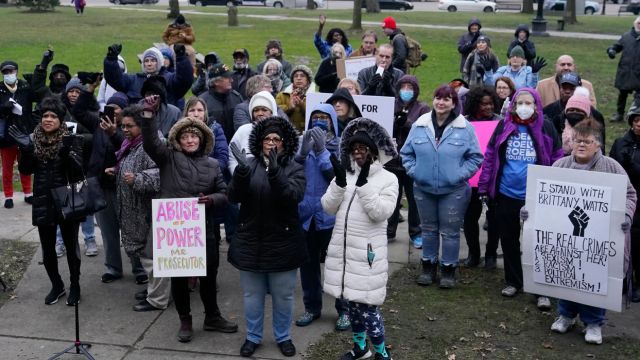Grand Jury Clears Ohio Woman in Home Miscarriage Case
Navigating Reproductive Rights: The Brittany Watts Case and the Legal Landscape Post-Roe v. Wade
Brittany Watts, an Ohio woman, faced a deeply distressing situation when she encountered a miscarriage, thrusting her into the international spotlight. This unfortunate incident brought to light the potential legal ramifications women may face when their pregnancies conclude, whether through abortion or miscarriage.
The Warren Police Department, following counsel from the Warren City Prosecutor’s Office, levied a serious charge against Watts: abuse of a corpse. This legal action stemmed from the aftermath of her miscarriage, where the nonviable fetus was left at her home.
The legal journey commenced as the case transitioned from a municipal court to a Trumbull County grand jury. Following a thorough evaluation, the grand jury returned a “no bill” on the abuse of a corpse charge, citing insufficient evidence for an indictment against Watts.
Notably, Trumbull County Prosecuting Attorney Dennis Watkins clarified that his office neither assessed the evidence nor advised on charging Watts. Despite the felony charge, Watts escaped criminal charges, with Watkins expressing disagreement over the lower court’s application of the law.
Traci Timko, Brittany Watts’ attorney, vehemently contested the felony charge of abusing a corpse against the 34-year-old, arguing that Ohio law did not support this claim.
The incident unfolded as Watts, grappling with severe bleeding, sought medical attention days before her September miscarriage. The medical professionals at the hospital declared the fetus nonviable, triggering a notification to the Warren Police Department, which responded to Watts’ residence.

However, the grand jury’s decision illuminated a lack of evidence to substantiate criminal charges against Watts.
In response to the legal scrutiny, Traci Timko, Watts’ attorney, vociferously contended that her client had been unfairly “demonized for something that takes place in the privacy of women’s homes regularly.”
Timko shed light on the emotional toll the past three months had exacted on Watts, emphasizing the outpouring of support from countless women who shared their own stories of pregnancy loss.
Timko expressed gratitude for the grand jury’s decision, acknowledging the collective impact of emails, letters, calls, donations, and prayers that empowered Watts through each challenging day.
The broader landscape of reproductive rights and legal complexities came sharply into focus with the reference to the Supreme Court’s 2022 decision overturning Roe v. Wade. Post this pivotal decision, several states implemented trigger laws, ushering in new restrictions or outright bans on abortion.
Consequently, women encountered formidable barriers to accessing abortion, especially those with fetuses carrying fatal abnormalities or facing potentially life-threatening pregnancies. The vagueness of medical exemption clauses and the fear of severe legal consequences added further complexity.

In response to queries about the charge against Watts, her attorney pointed to ignorance, particularly the lack of knowledge and insight among men regarding miscarriage and women’s health, as a significant factor. This raised legitimate concerns about the potential influence of the post-Roe v. Wade legal landscape on actions taken against women who have experienced miscarriages.
Brittany Watts’ legal saga unfolded against the backdrop of evolving reproductive rights. The grand jury in Ohio opted not to indict Watts on a felony charge of abusing a corpse. Watts, arrested following her miscarriage, grappled with an unusual interpretation of state law, which, if she had been convicted, could have resulted in a year of imprisonment.
Traci Timko, Watts’s lawyer, expressed relief and optimism for change, underscoring the emotional toll on her client.
Dennis Watkins, the Trumbull County prosecutor, meticulously outlined the case and prosecution timeline, asserting that Watts had not violated the law as initially claimed. The discordance with the lower court’s application of the law, coupled with the obligation to adhere to Ohio law, necessitated the grand jury proceeding.
Wendy A. Bach, a law professor, contributed insights into the growing trend of employing criminal law to address reproductive health matters, particularly those impacting marginalized groups.
The case ignited discussions about access to reproductive healthcare following the Supreme Court’s decision, ultimately leading Ohio voters to enshrine the right to abortion until the point of fetal viability in the State Constitution.
The legal proceedings delved into the specifics of Watts’s hospital visits, treatment delays, and the subsequent discovery of the fetus in her bathroom toilet. The rare employment of the abuse-of-corpse charge prompted conversations about the criminalization of reproductive health issues and societal perceptions of miscarriage realities.
Traci Timko’s assertion that Watts’s actions would only outrage those who don’t understand the realities of miscarriage underscored the emotional toll on her client. The grand jury’s decision prompted a celebratory rally in Warren, complemented by a GoFundMe account that garnered substantial support for Watts.
The case, originating as a deeply personal ordeal, gained nationwide attention, transforming Watts’s circle from her immediate environment to a broader community.
The upheaval she experienced illustrated the far-reaching implications of legal actions involving reproductive health, spurring discussions about the imperative need for empathy, understanding, and legal reform in addressing such delicate matters.
